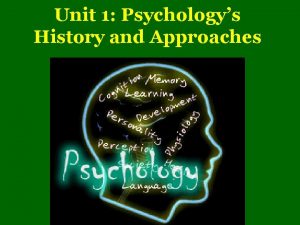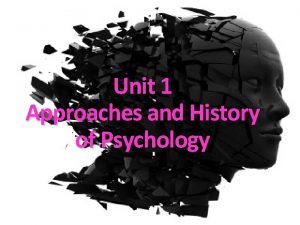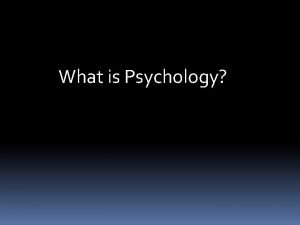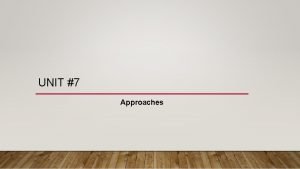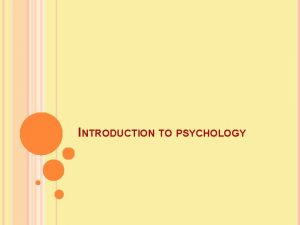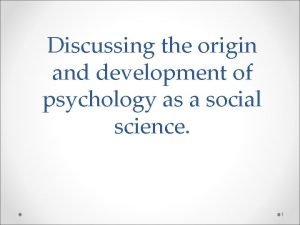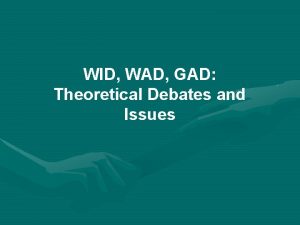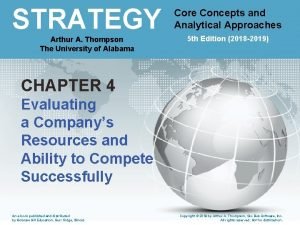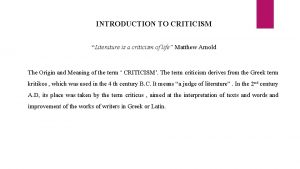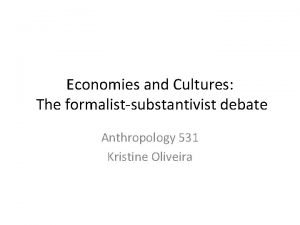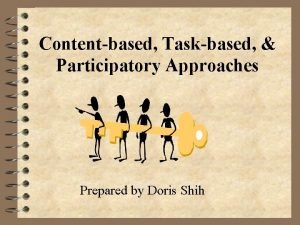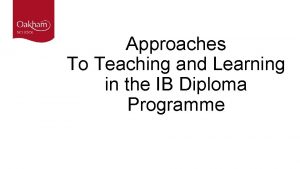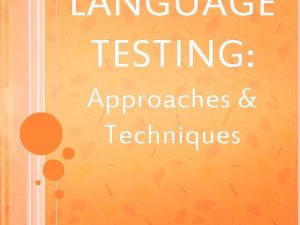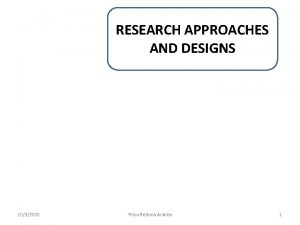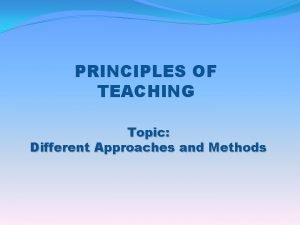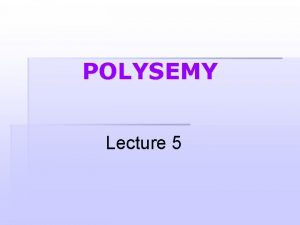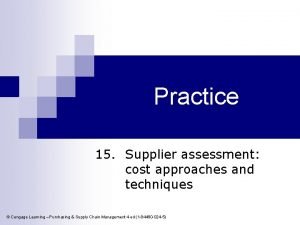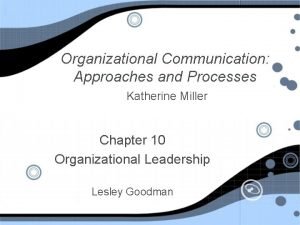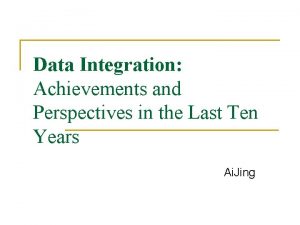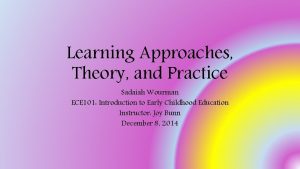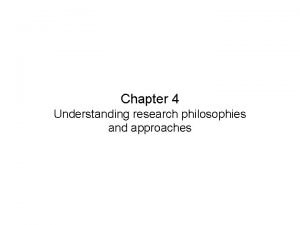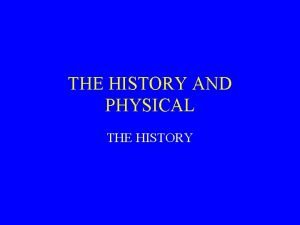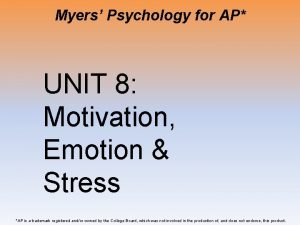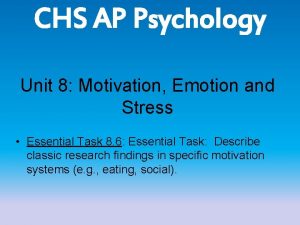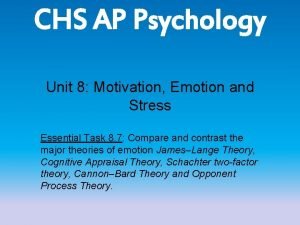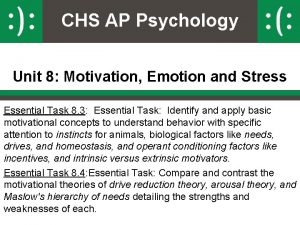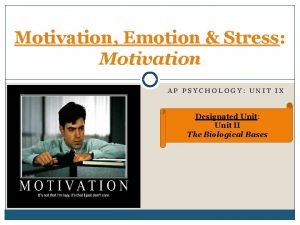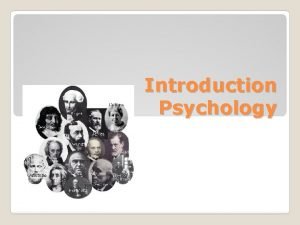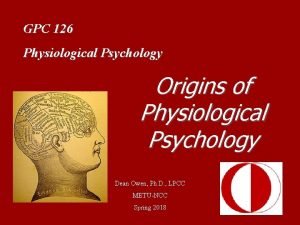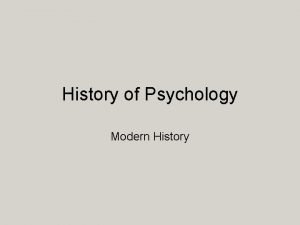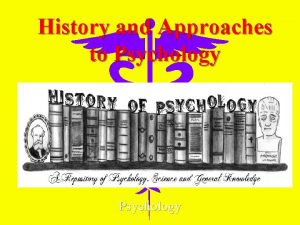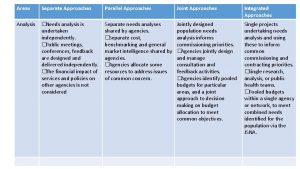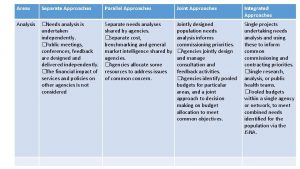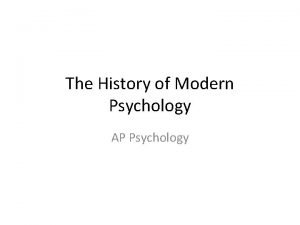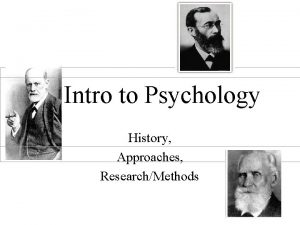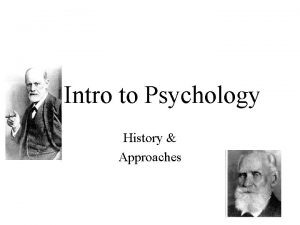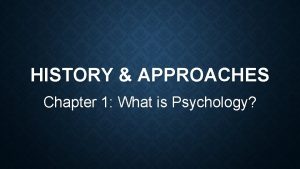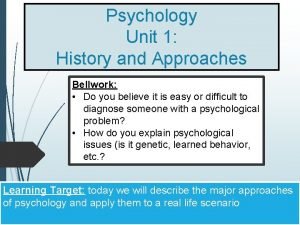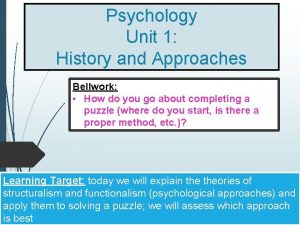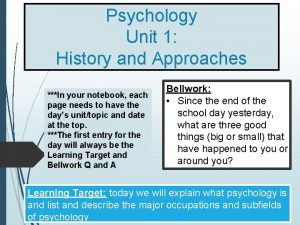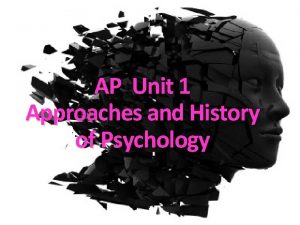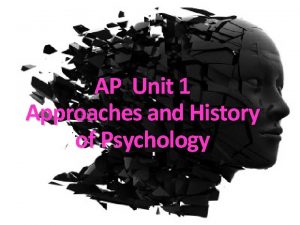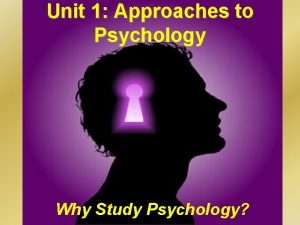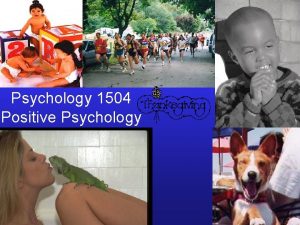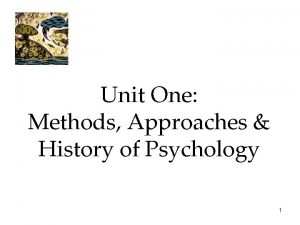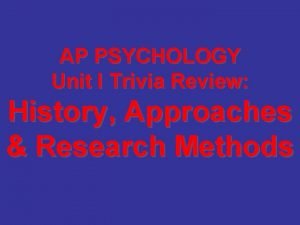Psychology History and Approaches AP Psychology Unit 1











































- Slides: 43

Psychology History and Approaches AP Psychology Unit 1

The Story of Psychology What is Psychology? § Psychology’s Roots § Nature v. Nurture § Mind-Body § Evolutionary § Psychological Science Develops § Empirical Research

Psychology’s Roots Aristotle (384 -322 B. C. ) http: //faculty. washington. edu Aristotle, a naturalist and philosopher, theorized about psychology’s concepts. He suggested that the soul and body are not separate and that knowledge grows from experience.

Nature or Nurture?

Nature vs Nurture – Which is more important? From: Robert L Windemuth (with a nod to Lenny Bruce) The son of two brilliant astrophysicists was lost as a child and raised by a pack of wild dogs. When he was 16 he was found. He made a quick adjustment back to civilization and graduated from MIT with highest honors at the age of twenty. Unfortunately, he was killed the next year while vacationing in France when he suddenly broke from his tour group to chase a car.

The Mind/Body Problem • What is the relationship between the mind and the body? • Does the mind control the body or the body control the mind? • Is the mind nothing more than the body? • Might the body itself be a product of the mind?

Mind-Body / Phrenology • Franz Gall – Variations in character correlate with variations in external craniological signs – Bumps in the cranium relate to areas of the brain Unit I History and Approaches 7

Dualism V. Monism • Dualism suggests that the brain is physical and the mind is something else. • Classical dualism - Descartes – the mind controls the body through the Pineal Gland • Parallelism – mind and body are isolated and exist in separate worlds • Epiphenomenalism - The brain causes the mind

Dualism V. Monism • Idealism/Solipsism - The mind and body both exist in a mental realm. Solipsism suggests that the whole world/universe exists in the mind • Materialism - Mind and body are both physical. There is no non-physical, mental world.

Evolution • Dirk brings his family tree to class Unit I History and Approaches 10

Evolution - Charles Darwin • Natural Selection – Promotes the survival of the fittest individuals – Favorable heritable traits become more common in success generations – Unfavorable traits become less common Unit I History and Approaches 11

Evolution - Charles Darwin • Individuals do not evolve, species evolve. • This happens through natural selection. • Individuals best suited/adapted to a particular environment will survive and pass on their genes by reproducing more. • The rest may die or reproduce less. • Future generations will be better adapted to the environment (i. e. the species has evolved. Unit I History and Approaches 12

Evolution and Psychology • Evolutionary psychology regards humans as subject to same evolutionary processes as other animals (continuity) – Assumes that behavioral characteristics can be inherited just like physical ones – Tries to explain human behavior/psychology in terms of evolutionary processes Unit I History and Approaches 13

Psychology’s First Experiments • The Story of Psychology by Morton Hunt • Psamtick I, King of Egypt • Wanted to prove Egyptians were the most ancient race on earth • Page 3 prologue

Empiricism • The belief that observation and experience are the basis of knowledge.

Empiricism • Challenged the view that knowledge is innate • Knowledge is the result of experience and observation • Development of rules of science • Important to the development of scientific psychology Unit I History and Approaches • • John Locke George Berkeley David Hume Francis Bacon 16

Structuralism • Influenced by work of • Weaknesses – Wilhelm Wundt – Concentration on consciousness – Edward Titchener – Experimental • Strengths methods were – The first major too subjective school of thought in – Concentration on psychology internal behavior – Strong influence on (introspection) experimental psychology Unit I History and Approaches 17

Structuralism • Wundt Unit I History and Approaches • Titchener 18

Functionalism • Influenced by work of – William James – Charles Darwin • Sought to explain mental processes in a more systematic and accurate manner • Focused on the purposes of consciousness and behavior Unit I History and Approaches • Major influence on – Behaviorism – Applied Psychology • Strong influence on – The educational system – The philosophy of John Dewey • The belief that children should learn at the level for which they are developmentally prepared 19

Functionalism • William James Unit I History and Approaches 20

Gestalt Psychology • Reaction to the reductionism of Wundt • the word Gestalt means a unified or meaningful whole • based on the observation that we often experience things that are not a part of our simple sensations Unit I History and Approaches • Max Wertheimer • Wolfgang Köhler • Kurt Koffka 21


phi phenomenon • Werthimer noted that we perceive motion where there is nothing more than a rapid sequence of individual sensory events. • Experimented with lights flashing in rapid succession Unit I History and Approaches • Examples: – Christmas lights that blink off and on – Neon signs in Las Vegas – Basic principle of motion pictures – individual still pictures in rapid 23 succession

http: //highered. mcgrawhill. com/sites/0070579431/student_view 0/c hapter 8/phi_phenomenon_activity. html

Unconscious Influences • And that these • Sigmund Freud and unconscious urges, Psychoanalysis desires, and memories • Conscious, have a direct impact on subconscious, and our emotions and unconscious behavior • Theory that much of our minds thinking and • Freud placed a great deal of emphasis on the memory are not sexual nature of the accessible to our unconscious awareness Unit I History and 25

Behaviorism • Theory that all behaviors are learned, or acquired through conditioning • Behavior can be studied in a systematic and observable manner with no consideration of internal mental states Unit I History and Approaches • Reaction to Freud’s emphasis on the unconscious • Reaction to much of psychology which was not considered objective or scientific • Ivan Pavlov, John Watson, Clark Hull, B. F. Skinner 26

Cognitive Psychology • Investigates internal mental processes such as problem solving, memory, and language • Foundations in Gestalt psychology and Jean Piaget • Ulric Neisser coined the term in 1967 • In part a reaction to behaviorism Unit I History and Approaches • George A Miller • "The Magical Number Seven, Plus or Minus Two: Some Limits on Our Capacity for Processing Information“ (1956) 27

Social Situations / Group Dynamics • Kurt Lewin was one of the • Field Theory – Looking at the factors modern pioneers in (forces) that influence – Social psychology a situation, originally – Organizational social situations psychology • Leadership and – Applied psychology management • Often seen as the – Authoritarian, founder of social democratic, and laissez psychology -faire work environments 28

• • • Early Contributors to Psychology G. Stanley Hall (1882) Mary Whiton Calkins (1891) Margaret Floy Washburn (1894) Gilbert Haven Jones (1909) Leta Stetter Hollingworth (1916) Francis Cecil Sumner (1920) Unit I History and Approaches 29

G. Stanley Hall • Earned his doctorate in psychology with William James in 1878 • Traveled to Leipzig to study with Wundt • Developed what is considered the first American psychology laboratory (at Johns Hopkins University • First President of the APA – Instrumental in the founding of the APA Unit I History and Approaches 30

Mary Whiton Calkins • Harvard refused to grant her a doctoral degree unless she received it through Radcliffe • opened one of the first psychological laboratories in the United States at Wellesley College in 1891. • Became the first woman president of the American Psychological Association (1905) Unit I History and Approaches 31

Margaret Floy Washburn • Allowed to audit classes at Columbia and work in James Cattell’s laboratory • First woman to receive a Ph. D. in psychology (Cornell 1894) • Studied with Titchener • Her book The Animal Mind (1908) suggested that mental processess of animals are a a legitimate area of study • President of APA (1921) Unit I History and Approaches 32

Gilbert Haven Jones • One of first African Americans to earn a doctorate in psychology. • Received his Ph. D. in psychology in Germany 1909 Unit I History and Approaches 33

Francis Cecil Sumner • First black man to receive a Ph. D. in psychology in America • Established an independent psychology program at Howard University • One of his students was Kenneth Clark whose studies were important in the Brown v Board of Education Unit I History and Approaches 34

Psychology’s Three Main Levels of Analysis

Psychology’s Current Perspectives Perspective Focus Sample Questions Neuroscience or How the body and brain Biological (pinky) enables emotions? James Olds, Roger Sperry, David Hubel, Thorsten Wiesel How are messages transmitted in the body? How is blood chemistry linked with moods and motives? Evolutionary Darwin, Wilson, David Buss How does evolution influence behavior tendencies? How the natural selection of traits the promotes the perpetuation of one’s genes? Behavior genetics How much our genes and our environments influence our individual differences? To what extent are psychological traits such as intelligence, personality, sexual orientation, and vulnerability to depression attributable to our genes? To

Psychology’s Current Perspectives Perspective Focus Sample Questions Psychodynamic or psychoanalytic Freud, Jung, Adler How behavior springs from unconscious drives and conflicts? How can someone’s personality traits and disorders be explained in terms of sexual and aggressive drives or as disguised effects of unfulfilled wishes and childhood traumas? Behavioral Pavlov, Watson, Skinner How we learn observable responses? How do we learn to fear particular objects or situations? What is the most effective way to alter our behavior, say to lose weight or quit smoking?

Psychology’s Current Perspectives Perspective Focus Sample Questions Cognitive George Miller, Ulric Niesser, Herbert Simon, Piaget, Chomsky How we encode, process, store and retrieve information? How do we use information in remembering? Reasoning? Problem solving? Social-cultural How behavior and Malinowski, John thinking vary across situations and cultures? Berry, Patricia Greenfield How are we — as Africans, Asians, Australians or North Americans – alike as members of human family? As products of different environmental contexts, how do we differ? Humanistic Maslow, Rogers What are people motivated to be? Self directed Focus on human experience

Psychology’s Subfields: Research Psychologist Biological Developmental Cognitive Personality Social What she does Explore the links between brain and mind. Study changing abilities from womb to tomb. Study how we perceive, think, and solve problems. Investigate our persistent traits. Explore how we view and affect one another.

Psychology’s Subfields: Research Data: APA 1997

Psychology’s Subfields: Applied Psychologist Clinical What she does Studies, assesses, and treats people with psychological disorders Counseling Helps people cope with academic, vocational, and marital challenges. Educational Studies and helps individuals in school and educational settings Industrial/ Organizational Studies and advises on behavior in the workplace.

Psychology’s Subfields: Applied Data: APA 1997

Clinical Psychology vs. Psychiatry A clinical psychologist (Ph. D. ) studies, assesses, and treats troubled people with psychotherapy. Psychiatrists on the other hand are medical professionals (M. D. ) who use treatments like drugs and psychotherapy to treat psychologically diseased patients.
 Linear perspective ap psychology
Linear perspective ap psychology Ap psychology module 2 review
Ap psychology module 2 review Approaches to psychology
Approaches to psychology Seven approaches to psychology
Seven approaches to psychology Structuralism vs functionalism
Structuralism vs functionalism Where do most psychologists work
Where do most psychologists work Rogers humanistic theory
Rogers humanistic theory Seven approaches to psychology
Seven approaches to psychology Unit 10, unit 10 review tests, unit 10 general test
Unit 10, unit 10 review tests, unit 10 general test Psychology definition
Psychology definition Scope of psychology
Scope of psychology Structuralist school of thought
Structuralist school of thought Difference between wid and wad
Difference between wid and wad A company's resources and capabilities represent
A company's resources and capabilities represent Semantic structure of the word
Semantic structure of the word Expressive criticism example
Expressive criticism example Formalist substantivist debate
Formalist substantivist debate Content based task based and participatory approaches
Content based task based and participatory approaches 5 approaches to health promotion
5 approaches to health promotion Ib approaches to teaching and learning
Ib approaches to teaching and learning Essay translation approach example
Essay translation approach example Mode of discourse in register
Mode of discourse in register Quasi experimental design example
Quasi experimental design example Teacher dominated approach
Teacher dominated approach Synchronic and diachronic approaches to polysemy
Synchronic and diachronic approaches to polysemy Develop new approaches to public governance and engagement
Develop new approaches to public governance and engagement Cost approach and techniques in supplier assessment
Cost approach and techniques in supplier assessment Organizational communication: approaches and processes
Organizational communication: approaches and processes Data cleaning problems and current approaches
Data cleaning problems and current approaches Data integration problems approaches and perspectives
Data integration problems approaches and perspectives Pricing considerations and approaches
Pricing considerations and approaches Learning approaches, theory, and practice
Learning approaches, theory, and practice What is linguistic
What is linguistic What is this image
What is this image Research philosophies and approaches
Research philosophies and approaches Also history physical
Also history physical Anorexia nervosa ap psychology definition
Anorexia nervosa ap psychology definition Unit 8 motivation and emotion
Unit 8 motivation and emotion Two factor theory psychology
Two factor theory psychology Instinct ap psych definition
Instinct ap psych definition Ap psychology unit 8 motivation emotion and stress
Ap psychology unit 8 motivation emotion and stress Gestalt
Gestalt Physiological psychology
Physiological psychology History of cognitive psychology
History of cognitive psychology
